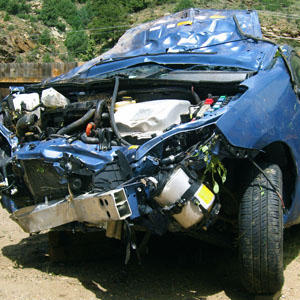
Wrecked Toyota Prius owned by Elizabeth James, photo by Ted James, from Houston Press
So-called "sudden acceleration" has floated around the automotive world since it burst onto the scene in 1986. Now the Toyota Prius has become the latest vehicle in which the syndrome is alleged.
But like every other vehicle accused of speeding up without warning, no conclusive evidence of a systematic or repeatable problem has been uncovered--despite dramatic photos of wrecked Priuses, and even one of a Prius in a rushing river.
It started last month, when a lengthy article in the Houston Press entitled "Wild Rides" amassed several instances in which Prius owners allege that their cars stalled, accelerated wildly, or failed to respond to their brakes.
It's an odd article, with accident anecdotes, discussions of hyper-miling, and quotes from Toyota dealers about how hard it is to sell Priuses when gas is cheap. It even name-drops Hollywood celebrities like Leonardo DiCaprio and Cameron Diaz who own Priuses.
But a look at the data on the supposed sudden acceleration, including research posted by members of the popular PriusChat forum, paints a different picture.
Three main points counter the allegation that the Prius has a tendency to accelerate out of control, endangering its drivers.
(1) Proportionally, complaints about the Prius occur no more often than for other vehicles.
If you look up vehicles through the NHTSA's Office of Defect Investigation, you'll note that complaints of injuries due to "speed control" issues are recorded for more than 100 separate models. For the 2005 Toyota Prius owned by PriusChat member CHogan2, the data show 10 complaints and one injury logged, from a population of about 85,000 Priuses sold that year. Statistically, that's low enough to be considered "noise level".
CHogan2 then downloaded and tabulated all complaints related to vehicle speed control for the 2004-2009 Toyota Prius, which ranked only 18th in reported injuries. That's roughly consistent with the number of Priuses sold as a proportion of overall new cars.
(2) No vehicle can out-accelerate its brakes.
All cars are designed so the brakes are powerful enough to stop the car under its maximum engine power. In other words, flooring the acclerator and the brake pedal brings the car to a halt. And for more than 30 years, cars have been fitted with redundant dual braking systems, so that if one set of brake pipes loses pressure, the other will stop the car.
Assertions in the article, like the one from Prius owner Bobette Riner that she "pushed on the brakes but they were dead," are not technically credible.
(3) "Sudden acceleration" has never been proven in any vehicle.
Reports of sudden acceleration rise substantially every time stories appear about the syndrome, but the first and most famous such allegation--in a 1986 segment on "60 Minutes" dealing with the Audi 5000--was ultimately traced to driver error.
Safety experts suggest that increasingly distracted drivers--Ms. Reiner admits she constantly watched the central monitor in her Prius to maximize gas mileage--may not be aware of their speed, and can even press the accelerator thinking it is the brake pedal.
CONCLUSION:
Given the history of "sudden acceleration," the lack of any provable defect, and the predictable number of complaints, it's hard to conclude that there's any problem.
Or as PriusChat member Miscrms puts it, For the throttle control computer and hydraulic brakes to both fail all of a sudden and then magically fix themselves a few minutes later is basically impossible. One is an electrical system and the other is mechanical. They are independent. This is no more possible than both your mechanically-linked-but-computer-controlled fuel-injection system throttle sticking open and your hydraulic brakes failing in any "normal" car.
The Prius isn't the first Toyota to suffer from complaints of sudden or unintended acceleration. Last September, the National Highway Traffic Safety Administration closed a lengthy investigation into 431 reported incidents in 2004-2008 Toyota Tacoma pickup trucks, after concluding that no repeatable pattern could be observed.
One suggested cause for the alleged syndrome is the Toyota "drive-by-wire" system used on both the Prius and the Tacoma. This translates pressure on the accelerator pedal into electric signals that change engine speed, rather than using a mechanical connection.
Toyota insists its software continuously checks to ensure that the throttle opening on the engine is consistent with the position of the pedal. In the Tacoma case, no vehicle inspected by a dealer showed any evidence of software problems.

Wrecked Toyota Prius owned by Elizabeth James, photo by Ted James, from Houston Press












